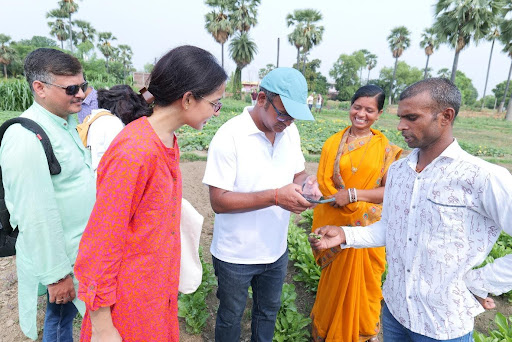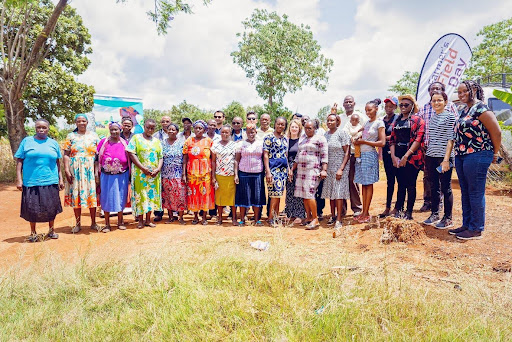The integration of AI into agriculture promises to revolutionize the industry, enhancing productivity, sustainability and resilience. AI-powered tools hold the potential to empower farmers worldwide, particularly in developing countries, enabling them to overcome challenges and thrive. According to the International Food Policy Research Institute, data-driven agriculture techniques could increase farm productivity by up to 67% by 2050, while reducing agricultural and food losses.
As AI continues to progress, its influence on agriculture is poised to deepen, marking a transformative shift across every aspect of farming. This evolution stands as a cornerstone in guaranteeing food security for our expanding global population. The advent of mobile-based information retrieval, coupled with advancements in generative AI, holds the promise of extending these benefits to smallholder farmers. The power of generative AI lies in its capacity to assimilate unstructured information in various formats and present it in a comprehensible manner. This innovative tool seamlessly processes inputs in the form of text, voice or images, delivering essential information to farmers and extension workers. This real-world application underscores the practical impact of AI, translating complex data into actionable insights for those at the heart of our agricultural communities.
AIEP: A Catalyst for Change in Bihar and Kenya
The Agriculture Information Exchange Platform (AIEP) exemplifies the transformative power of AI in agriculture, particularly in regions like Bihar, India, and Kenya. Developed by Deutsche Gesellschaft für Internationale Zusammenarbeit (GIZ) under the FAIR Forward initiative, and funded by the Bill and Melinda Gates Foundation, AIEP brings AI's benefits to the grassroots level. Partners such as CLEAR Global have been instrumental in shaping this platform, ensuring that it addresses the unique challenges of smallholder farmers in these regions. By doing so, AIEP acts as a beacon of hope for the Global South, demonstrating the potential of AI to drive positive change.
Harnessing Cutting-edge Technology for Agriculture
AIEP employs an omni-channel delivery mechanism, utilizing text, voice, and video formats to disseminate information. This makes it accessible on both feature phones and smartphones, ensuring that even farmers with basic mobile devices can benefit. By leveraging technologies such as generative AI, natural language processing (NLP), text-to-speech (TTS), and speech-to-text (STT), AIEP provides hyper-localized, actionable information. This approach bridges the gap left by traditional agricultural extension services, offering tailored guidance that meets the specific needs of smallholder farmers.

Impact on Climate Change Mitigation and Adaptation
AIEP's impact is particularly significant in the context of climate change. In Bihar and Kenya, the platform has proven its ability to support farmers in adapting to and mitigating the impacts of climate change. It provides real-time weather updates, advice on climate-smart agricultural practices, pest and disease management, and sustainable land use techniques. Furthermore, AIEP facilitates access to climate finance, training, and market information, enhancing farmers' resilience to environmental changes. By promoting sustainable agricultural practices and efficient resource management, AIEP not only supports farmers in adapting to current challenges but also contributes to long-term climate change mitigation.
Overcoming Challenges: Building Trust and Capacity
The journey of integrating AI into agriculture is not without challenges. One major hurdle is the need for AI-readable, localized data that is both relevant and easy to understand. This is crucial for the effectiveness of AI solutions but often difficult to achieve. Additionally, shifting farmers from traditional advisory methods to AI-based solutions requires overcoming scepticism and building trust in the new technology.
To address these challenges, AIEP employs a human-in-the-loop approach. Trusted extension workers deliver AI-generated insights to farmers, bridging the trust gap and ensuring the advice is well-received. Collaborations with government entities help to vet and approve advisory content, further enhancing its credibility. AIEP also prioritizes capacity building, training both farmers and extension workers in the use of AI technologies. This approach not only improves skills and confidence but also facilitates a smoother transition to AI-driven agricultural practices.
Conclusion: Paving the Way for a Resilient Future
The Agriculture Information Exchange Platform represents a significant leap forward in agricultural support, combining innovative technology with a commitment to inclusivity and sustainability. By delivering personalized, actionable information through multiple channels and addressing the key challenges of AI adoption, AIEP is transforming agricultural practices in Kenya and India. Its contributions to climate change adaptation and mitigation highlight its potential to drive sustainable agricultural development and improve the livelihoods of smallholder farmers. Through its collaborative efforts and focus on trust and capacity building, AIEP is setting a new standard for agricultural technology solutions, paving the way for a more resilient and sustainable future in agriculture.
Contact details
Christian Merz
Kirti Pandey
The Amazon rainforest, often referred to as the "lungs of the Earth," is not just a global environmental treasure but also a critical economic resource, especially for Brazil. Among its vast natural offerings, açaí has emerged as one of the most prominent symbols of the Amazon's bioeconomy. This small purple berry, once a staple of local diets, has turned into a global superfood phenomenon, driving significant economic activity in the region. However, the rapid expansion of açaí production and other bioeconomic activities due to nutritional value and market demand has had a serious impact on the lowland forests. Expansion of acai is causing loss of biodiversity and native species in the region, which in turn is resulting in lower productivity of the acai plant because of loss of pollinators- a phenomenon now termed as Acai-fication.
These challenges are exacerbated by changing weather patterns, including unpredictable rainfall and longer dry seasons, impacting crop yields and farming cycles as acai grows in wetlands that are accustomed to flooding. Ignoring the local biodiversity is harmful not only to the booming industry but also to floodplains that are disappearing due to vegetation holding the land. These are local challenges that technology can help address and preserve the mighty Amazon and its local practices.
Farmers predominantly believe that growing more acai palms will translate into a bigger harvest, thus enabling sustainable agri learning that focuses on low impact acai farming practices and advisory information, which will help in combating misinformation, increasing yield and higher production quality. E-learning platforms can offer training in sustainable farming practices covering agroforestry, soil management and conservation techniques, and entrepreneurship. These e-learning initiatives must be supplemented with community knowledge sharing where local farmers can share best practices, access expert advice, and collaborate on sustainable farming techniques.
Additionally, access to credit and subsidies to farmers that focus on sustainable agri practices without compromising biodiversity can be helpful incentives. This can be augmented by transparency in the supply chain, ensuring that products labelled as "sustainable" truly meet environmental and social standards. For açaí producers, this could mean tracking the berry from harvest to market, providing consumers with verifiable information about its origin and ensuring fair compensation for local communities. With the Belem-City wide network (Rede Belém Aberta) - a beckn-protocol based open, interoperable, federated network - the CIty administration can transform the agriculture sector by enabling the discovery and delivery of verified agricultural content, best practices, and agri-skilling resources across a wide range of private and public platforms, fostering innovation and progress through a collaborative approach.
Surge in Acai has benefited the local communities and poorest of the poor tremendously and the benefits of the trade cannot be understated but it’s time to empower these communities with direct access to market and sustainable management practices to build climate resilient and diversified economies.


